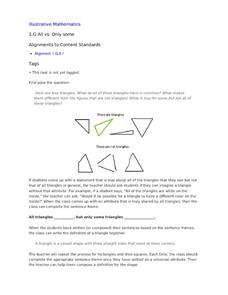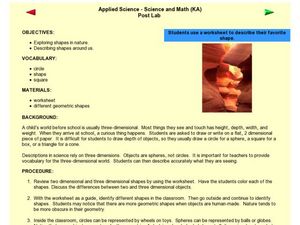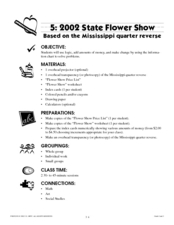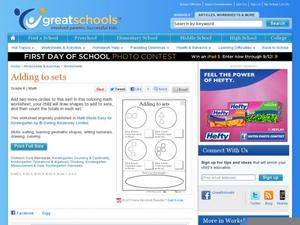Curated OER
Which One's Different?
One of these things is not like the others! Preschoolers identify which sock and glove is different from the rest, and draw a ring around the outlier. Then, they draw a sock and glove that are different from given pictures. Color the...
DK Publishing
Who's First?
Put ribbons, rabbits, and shapes in order with a number sequence activity. Three different activities reinforce counting and number sequence, as kindergartners color particular items and identify the first, second, and third in various...
Curated OER
Choral Counting I
Using a 100s chart or a number line with a pointer, work with your class to count up to 100 by ones and tens. As a part of daily instruction, prompt your kindergartners to chant count from 1 to 30. Move on to 1 to 50, and then from 1 to...
Curated OER
Five by Two
Help young mathematicians read and interpret numbers from 1 to 10 and sequence them correctly with this card game. Using a deck of cards and two to three classmates, have one player hand out ten cards to each gamer and then put the extra...
Illustrative Mathematics
All vs. Only Some
All shapes have certain defining attributes that set them apart from others. In order to understand this, young mathematicians look at examples and non-examples of triangles, rectangles, and squares, working as a whole class to create...
Curated OER
Applied Science: Exploring Shapes in Nature
Explore geometry with your young mathematicians! First, have them color in different two-dimensional and three-dimensional shapes. Then take them on a walk around the classroom. Can they identify different shapes using the target...
Curated OER
2002 State Flower Show
Here is another State Quarter lesson. This one uses the Mississippi State Quarter. Pupils utilize beautifully-designed worksheets embedded in the plan, to practice calculating which combinations of flowers they can afford to buy. They...
Curated OER
Above, On, and Below
This boating picture is missing a few things! Scholars practice common prepositions and counting as they add details to a scene. They follow specific directions by drawing two birds above the boat, three fish below it, and two ducks on...
Curated OER
Write the Word
Combine printing practice, shape recognition, and the color red with your kindergartners. They start by tracing the word red and writing it once or twice on their own. Then, they examine an image of flowers and color all the...
DK Publishing
Finish the Picture
Youngsters add some shapes to this castle drawing before analyzing its geometry. They count the circles, triangles, rectangles, and squares. The objectives here include drawing, recognizing, and counting shapes as well as writing numbers...
Curated OER
Match the Shapes
Which shape is the same? Young geometers match a triangle, circle, rectangle, and square to their identical counterparts, connecting them with a line from left to right. Then, they do the same thing with a set of four circular shapes,...
DK Publishing
Adding to Sets
After adding to several sets of shapes, scholars count the number in each set and write the total in a box. There are four sets here calling for one, two, three, and four more shapes to be added to the existing figures. A final bonus...
Curated OER
What Shapes Can You See?
This clown is missing some things, and young counters sequence single-digit numbers to complete this juggling act. They connect four separate connect-the-dots sequences to create two triangles and two squares, then complete three more...
Curated OER
Location on a Grid
Make coordinate pairs more engaging by having beginners color-code a grid based on given locations. The grid has numbers along the y-axis and letters along the x-axis, introducing them to the ordering of coordinate pairs with the x-axis...
Curated OER
Fewer Than
Which one has fewer? There are three sets of pictures here for young counters who determine which has fewer of a given detail. They look at apples on trees, cupcakes on plates, and spots on dogs, checking off the one with fewer....
Curated OER
Sets Of
Represent multiplication as sets of items for beginners to this concept. They look at six familiar object sets and determine the total number of legs by counting the sets. There is some scaffolding here, as the first is done for them and...
Curated OER
Long, Longer, Longest
This worm might be long, but can scholars draw an even longer worm? Focus on relative size as they draw a longer worm and then a longer necklace. Next, youngsters examine two sets of objects and check off the longest in an introduction...
Curated OER
The Same
Match up these silly monsters! There are six of them pictured, and young scholars match them to their identical twins. Encourage kids to explain why they made each match, focusing on specific attributes they noticed. Have them color the...
Curated OER
The Same
These monsters are only half-drawn! Challenge scholars to observe the line of symmetry and draw in the other half to reflect the first half. There are six simple monsters in all, and scholars can color them in once finished (encourage...
Curated OER
Most and Least Likely
Explore probability with beginners using these multiple-choice visuals. They determine what they are most likely to choose from a bag by examining the contents. Each bag has three types of similar objects with one more prevalent than the...
Curated OER
Tables
Can you read this table? Learners begin to comprehend data analysis through examining two simple tables and answering comprehension questions. The first gives characteristics about three animals in yes-or-no format (i.e. "eats insects,"...
Illustrative Mathematics
How Much Pie?
The connection between fractions and division is not always intuitive for 5th graders. Pie, on the other hand, is something 5th graders can connect with. Multiple pies divided among multiple people provide the platform for your...
Curated OER
Exponential Expressions - Perfect Squares, Square Roots
Color tiles are used to model perfect squares. Alone or in pairs, middle schoolers will find patterns. Afterward, the relationship between perfect squares and roots will be discussed as a whole class.
National Security Agency
Ordering, Adding and Subtracting Integers
Prealgebrarians use colored chips, stickers, and pencils to explore the world of integers. They discover absolute value, compare positive and negative integers, and apply operations to them. A detailed procedure for the three-part...
Other popular searches
- Math Coloring
- Math Coloring Sheets
- Math Operations Coloring
- Coloring Math Activity
- Map Coloring Math
- Math Coloring Worksheets
- Coloring Math Generator
- Christmas Coloring Math
- Math Multiplication Coloring
- Math Coloring Pages
- Code Math Coloring
- Spring Coloring Sheets Math

























